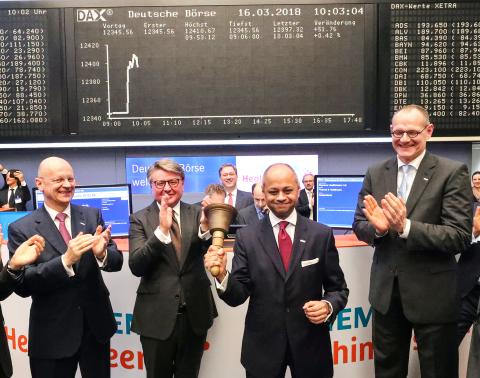Shares in Siemens AG’s medical technology unit surged in their debut on the Frankfurt stock exchange on Friday, after the industrial giant raised 4.2 billion euros (US$516.45 million) in a more muted than expected initial public offering (IPO).
Shares in Siemens Healthineers jumped more than 8 percent to close at 30.38 euros on the first day of trading, whose start was delayed by about 45 minutes because of a technical hitch.
The market launch was one of Germany’s biggest in recent years, but nevertheless fell below expectations after Siemens priced the 150 million shares up for grabs — representing a 15 percent stake in Healthineers — at 28 euros per share.

Photo: EPA-EFE
The price came in at the bottom end of Siemens’ initial guidance of 26 to 31 euros per share, and values the medical company at about 28 billion euros.
One of Siemens’ largest and most valuable divisions, Healthineers supplies hospitals around the world with everything from X-ray and MRI machines to lab diagnostics gear and robotic arms used in the operating room.
It is in robust health, achieving an operating profit margin of about 18 percent last year and revenue of 13.8 billion euros, second only to Siemens’ flagship but troubled power and gas unit.
Its flotation comes as the sprawling Siemens conglomerate seeks to become more nimble in response to changing markets and stronger competition.
The group last year announced a merger of its train construction business with French rival Alstom SA to create a European rail giant, merged its wind energy unit with Spain’s Gamesa Corp Tecnologica SA and unveiled plans to slash about 7,000 energy jobs due to falling global demand for its power plant turbines.
Healthineers’ IPO was tipped to be the largest on Frankfurt’s blue-chip DAX in more than two decades when it was first announced by Siemens late last year, with analysts estimating the offering would generate about 9 billion euros.
However, those expectations were dashed when Siemens this month said it would offer the stock at the lower-than-expected 26 to 31 euros per share, partly because of a spike in market volatility in recent weeks that has sapped investor demand.
The last Frankfurt IPO of a similar size was 2016’s listing of RWE AG’s renewables spin-off Innogy SE, which raised about 4.6 billion euros.
Healthineers is a world leader in medical imaging products in terms of annual revenues, but it lags behind competitors such as General Electric Co, Roche Holding AG and Royal Philips NV in the areas of diagnostics — which includes machines to analyze blood and urine tests — and advanced therapies, which focus on enabling minimally invasive medical procedures.
Siemen chief financial officer Ralf Thomas, who helped ring the opening bell, expressed satisfaction at Healthineers’ debut, saying that the group looked forward to the company’s development “to the benefit of all shareholders.”
However, he was coy about what Siemens would spend the IPO windfall on.
“We always take one step at a time. When we have something to say, we’ll say it,” he told reporters in Frankfurt.

WEAKER ACTIVITY: The sharpest deterioration was seen in the electronics and optical components sector, with the production index falling 13.2 points to 44.5 Taiwan’s manufacturing sector last month contracted for a second consecutive month, with the purchasing managers’ index (PMI) slipping to 48, reflecting ongoing caution over trade uncertainties, the Chung-Hua Institution for Economic Research (CIER, 中華經濟研究院) said yesterday. The decline reflects growing caution among companies amid uncertainty surrounding US tariffs, semiconductor duties and automotive import levies, and it is also likely linked to fading front-loading activity, CIER president Lien Hsien-ming (連賢明) said. “Some clients have started shifting orders to Southeast Asian countries where tariff regimes are already clear,” Lien told a news conference. Firms across the supply chain are also lowering stock levels to mitigate

Six Taiwanese companies, including contract chipmaker Taiwan Semiconductor Manufacturing Co (TSMC, 台積電), made the 2025 Fortune Global 500 list of the world’s largest firms by revenue. In a report published by New York-based Fortune magazine on Tuesday, Hon Hai Precision Industry Co (鴻海精密), also known as Foxconn Technology Group (富士康科技集團), ranked highest among Taiwanese firms, placing 28th with revenue of US$213.69 billion. Up 60 spots from last year, TSMC rose to No. 126 with US$90.16 billion in revenue, followed by Quanta Computer Inc (廣達) at 348th, Pegatron Corp (和碩) at 461st, CPC Corp, Taiwan (台灣中油) at 494th and Wistron Corp (緯創) at

NEW PRODUCTS: MediaTek plans to roll out new products this quarter, including a flagship mobile phone chip and a GB10 chip that it is codeveloping with Nvidia Corp MediaTek Inc (聯發科) yesterday projected that revenue this quarter would dip by 7 to 13 percent to between NT$130.1 billion and NT$140 billion (US$4.38 billion and US$4.71 billion), compared with NT$150.37 billion last quarter, which it attributed to subdued front-loading demand and unfavorable foreign exchange rates. The Hsinchu-based chip designer said that the forecast factored in the negative effects of an estimated 6 percent appreciation of the New Taiwan dollar against the greenback. “As some demand has been pulled into the first half of the year and resulted in a different quarterly pattern, we expect the third quarter revenue to decline sequentially,”

ASE Technology Holding Co (ASE, 日月光投控), the world’s biggest chip assembly and testing service provider, yesterday said it would boost equipment capital expenditure by up to 16 percent for this year to cope with strong customer demand for artificial intelligence (AI) applications. Aside from AI, a growing demand for semiconductors used in the automotive and industrial sectors is to drive ASE’s capacity next year, the Kaohsiung-based company said. “We do see the disparity between AI and other general sectors, and that pretty much aligns the scenario in the first half of this year,” ASE chief operating officer Tien Wu (吳田玉) told an